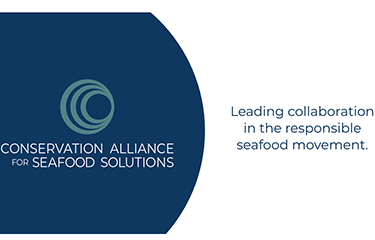The Conservation Alliance for Seafood Solutions has released a revised version of the report, “Guidelines for Supporting Fishery Improvement Projects” that now includes consideration of economic and social responsibilities.
The group is seeking to add signatories to the document as supporting organizations to the new FIP guidelines.
“The guidelines are the foundation of the vast majority of FIPs. With support from the responsible seafood movement, FIPs can build on their successful environmental improvement efforts and lead the way on social responsibility,” CASS Executive Director Mariah Boyle said.
The Conservation Alliance for Seafood Solutions was formed in 2008 to coordinate conservation organizations to promote sustainable seafood through a larger voice. Since its formation, it has grown to include over 120 organizations in 28 countries, and has set a goal to have 75 percent of global commercial seafood production be environmentally responsible by 2030.
Part of achieving those goals is to ensure FIPs – multi-stakeholder efforts that bring together the private sector to financially incentivize better management of marine resources and address social challenges in fisheries – are properly supported. According to the alliance, FIPs are responsible for over 8 percent of the world’s wild fish harvest, which is about 8 million metric tons of seafood, making these projects important to the overall 2030 goal.
Human rights and social responsibilitiesare now included in a new section in the revised version of the guidelines. Requirements to show compliance include demonstrating a public policy outlining commitments to human rights and social responsibility; providing information about vessels or fishers in the FIP; undertaking best efforts to inform fishers of their rights; demonstrating a grievance mechanism available to all fishers in FIP; completing a risk assessment based on the Social Responsibility Tool for the Seafood Sector (SRA) if operating in a high-risk context; creating a social workplan to address all areas of high risk; and reporting publicly on these requirements.
SmartFish Rescate de Valor Executive Director Cecilia Blasco, an alliance board member and project working group member, urged other NGOs to support the revised document.
“The Alliance's revised FIP guidelines include important updates to help FIP participants begin to address social responsibility," Blasco said. "The guidelines are key for setting common standards and expectations for this innovative and voluntary mechanism.”
The guidelines also include a section to supplement social responsibilities, such as information on fundamental human rights, labor rights, gender equity, and business responsibilities to respect human rights. Additionally, the revision includes a section on financial support of FIPs, assessing the costs and business case for conducting a FIP, and a business’ decisions to engage in FIPs.
Therevisions come after the original release of FIP support guidelines in 2012, a revision in 2015, and again in 2021 and 2022. The group said the updates were added with input from nearly 250 comments from about 40 organizations, business, coalitions, and individuals.
Photo courtesy of the Conservation Alliance for Seafood Solutions







